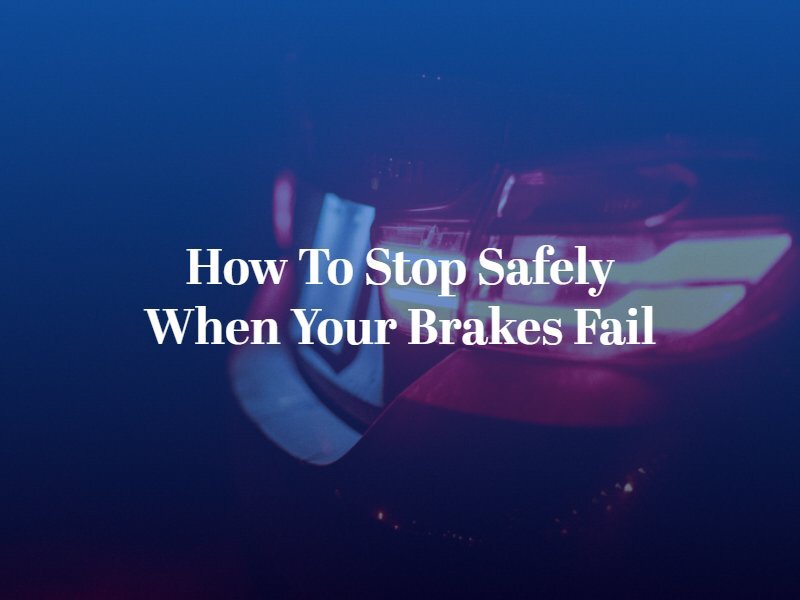What Should Drivers Do in Case of a Brake Failure?
Drivers experiencing a brake failure should do their best to remain calm and think clearly. Pump the brakes if you have an older model car without an anti-lock braking system (ABS), or try again with consistent pressure on the brake pedal if your car is a newer model with ABS. Engage your emergency brake and gear down. Turn on your hazard lights so that other drivers realize you are in trouble. Try to get your car off the road as it slows down, and don’t turn off the ignition until your car is stationary.
If brake failure leads to a collision, speaking with a Chicago car accident attorney can help protect your rights.
Why Pumping the Brakes or Reapplying Them May Help Slow Your Car Down
Older cars’ braking systems use the brake pedal to pump brake fluid to the brakes. If there is a leak in these lines, your brakes may fail. You’ll notice that the brake pedal doesn’t feel right. Pumping the brake pedal can help to build some temporary pressure, slowing your car down.
If you have ABS brakes, the Journal of Road Safety confirms that you should not pump the brakes. Instead, firmly press the brake pedal down and hold it there. Whatever stopping power is still in the system may kick in, helping you to slow down.
How to Use Emergency Brakes When Regular Breaks Don’t Work
Emergency brakes work independently and don’t rely on your regular braking system. This means they will still work, even when regular brakes fail. They are not as quick to stop a car, but you’ll still need to be careful to avoid losing control. Gradually pull the lever up and then shift into lower gears.
Gearing Down to Slow Your Car
When you select lower gears, your car’s engine will slow the car down. Do not skip gears, and don’t get frightened if your engine’s revs sound loud. That happens because you are travelling at a speed too high for the gear, and the revs will come down as resistance from the engine slows your car.
Why You Shouldn’t Turn Off the Ignition
You are in an emergency situation, and you need to remain in control of your vehicle to avoid a possible collision. If you turn off the ignition, you’ll lose steering power and make your car’s handling less responsive. When you turn the wheel, your steering may lock, causing you to lose control of your car.

How to Stop Safely When Your Brakes Fail
To keep yourself and other drivers safe, it is best to get your car to the side of the road. If you need to change lanes to do so, don’t forget to turn your indicator on and check your mirrors and blind spots. Keep your goals in mind: staying safe, keeping other drivers safe, and bringing your car to a standstill.
What to Do If a Collision Seems Imminent and Your Brakes Fail
This nightmare situation requires situational awareness and split-second judgment calls. If it is safe to avoid the collision by steering clear of an obstacle, or even speeding up a little, do so. In some instances, you can avoid a crash by steering clear of it more quickly than you can come to a stop.
Using a guard rail at the side of the road to slow your car is a risky maneuver, but if it seems your only chance of avoiding an accident, you can attempt it. You don’t want to forcefully collide with it. Instead, you want to grind the side of your car lightly against it. Keep both hands on the wheel and be ready to respond quickly to the steering. If a crash does occur, a car accident attorney in Chicago can guide you through your legal options.
Can You Sue Anyone for Damages If Your Brakes Fail?
The cause of the brake failure determines whether you can sue anyone or not. If you have a relatively new, well-maintained car, its manufacturer may be liable for selling a faulty product. If you recently had your brakes repaired, a mechanic may have been negligent, and the company they work for could be liable.
However, if their work was done adequately, the manufacturer of the newly-installed components may be the liable party. Lawsuits such as this can be incredibly complex, and you should seek professional guidance. To discover what your options are and how much you may be able to recover, consult a Chicago product liability lawyer or car accident lawyer at Taxman, Pollock, Murray & Bekkerman.
